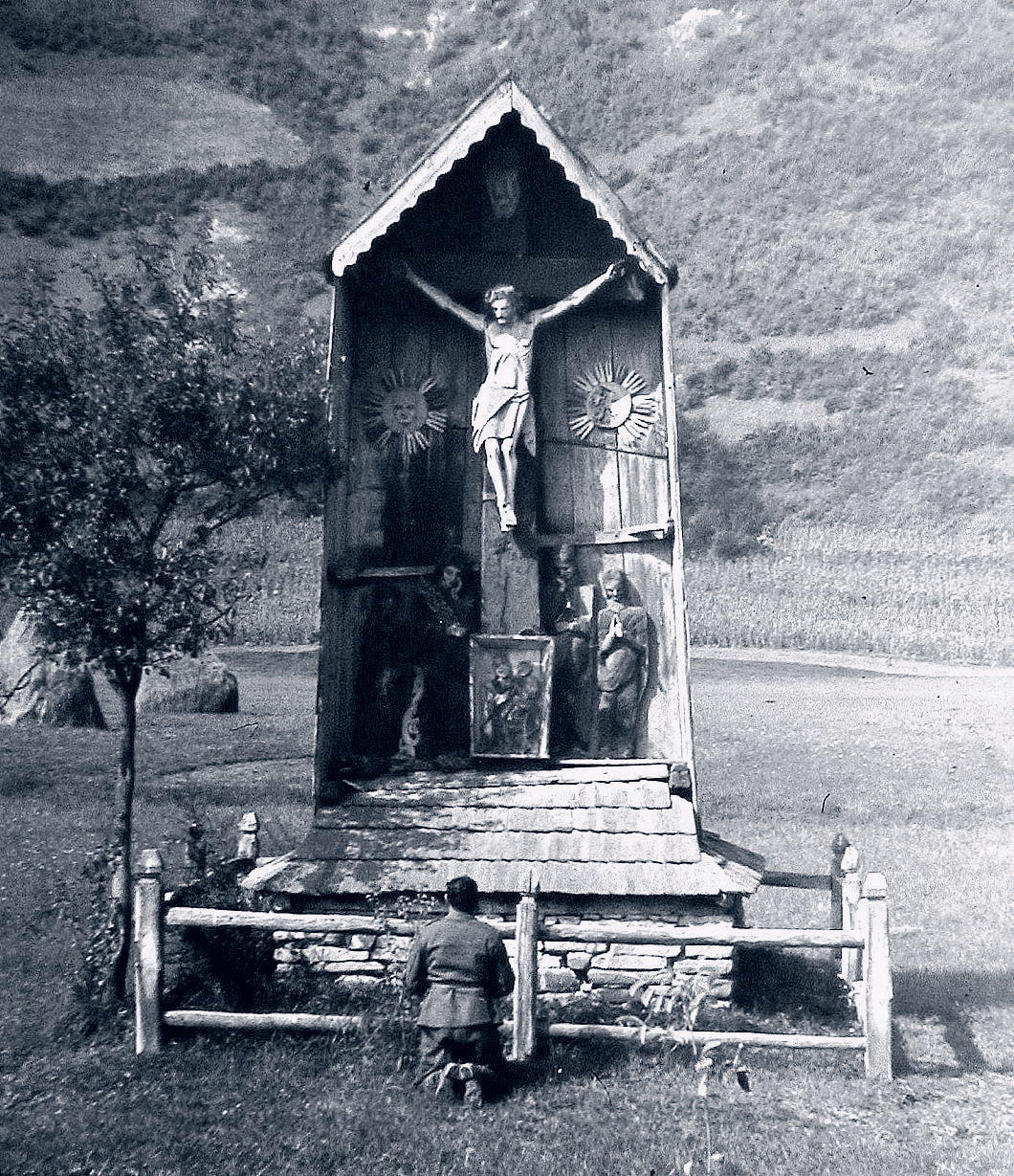Romania
About Andrew Cusack
 Writer, web designer, etc.; born in New York; educated in Argentina, Scotland, and South Africa; now based in London.
Writer, web designer, etc.; born in New York; educated in Argentina, Scotland, and South Africa; now based in London. read more
News
Blogs
Reviews & Periodicals
Arts & Design
World
France
Mitteleuropa
Knickerbockers
Argentina
The Levant
Africa
Cape of Good Hope
Netherlands
Scandinavia
Québec
India
Muscovy
Germany
Academica
Articles of Note: 20 May 2024

British right-liberals are sometimes accused of yearning for “Singapore-on-Thames” but they would, for example, recoil from the state-backed housebuilding that Singapore relies on.
The indomitable Lola Salem visited the flourishing Straits state.
“In everyday life,” she writes, “the state endeavours to demonstrate its relevance and ensure citizens feel that they have a stake in what is achieved in their name.”
But the foundation of Singapore’s undeniable strengths is “a complex tapestry of trade-offs that Western leaders wilfully or inadvertently ignore.”
■ Romania is a delight to visit, but I have only been to Transylvania which is somehow another category entirely. A bit like if you’ve been to Britain, but only (“only”) Scotland.
Christopher Brunet says that Romanians themselves tell foreigners to visit Transylvania and avoid their own capital city. He decided to do the opposite and spent a month as a boulevardier in Bucharest.
Brunet reports back that Romania is quietly doing great.
■ Without meaning to damn with faint praise, David Warren is one of the great Canadians of our age. I long felt an almost spiritual connection to him but, though we have never met in person, I assuaged myself that we were at least infrequent correspondents.
One day I went to check when was the last email I had from him only to be surprised to find that I had never, in fact, corresponded with him at all. So I wrote to him and told him this, which provoked a reply saying that he too had assumed we had written to one another several times. Two mastodons bellowing across primieval swamps, or the Atlantic ocean, or the Canadian border when I was still in New York.
Amongst David’s many accomplishments was the foundation and editorship of The Idler (1985-1993), the greatest Canadian magazine ever printed. Canada generously shovels endless cash at its literary efforts in the hope of producing something homegrown that can survive the onslaught of popular culture from its peaceful neighbours to the south.
Despite critical acclaim and obvious excellence, The Idler’s unfashionable conservatism meant that it never had access to the largesse distributed by the Canada Council for the Arts. As that body funded 96 different publications, David branded The Idler as “Canada’s 97th best literary magazine”.
David writes about his experience editing the review that described its ideal reader as “a sprightly, octogenarian spinster with a drinking problem, and an ability to conceal it”.

19¾ in. x 26 in.; (link)
■ Edinburgh was the site of the second-most venerable legislature in the English-speaking world, and it is worth wending a wander into Old Parliament Hall — one of the city’s three parliament buildings.
We’re all familiar with the way the House of Commons sits, having inherited the antiphonal seating of the old Chapel Royal of St Stephen in the Palace of Westminster.
At Old Edinburgh Reborn, Dr Robert Sproul-Cran has penned a very thorough examination of how seating was arranged in the Estaits of the Realm, the Scots parliament of old.
■ It would take a heart of stone not to be amused by the life and times of King Zog of Albania. He may have been a vulgar gangster but he had a certain flair, and one appreciates the imaginative even when it is self-aggrandising.
Daniel Marc Janes reviews a new book about the Illyrian potentate.
(And if you haven’t read the Albanian writer Ismail Kadare, you should.)
■ The sheer freakishness of American campus life is as fascinating as it is alarming.
The universities of the United States are some of the most influential factors of social control in the world, and whatever weird innovations you experience in your professional or public life worldwide today are usually explained by something that was going on at Yale or Stanford five or ten years before.
Ginevra Davis has written a sad chronicle of Stanford University’s war against social life. They even let an artificial lake go dry to stop people enjoying it!
■ What is more satisfying than the brilliant self-taught amateur who outshines the experts?
John Steele Gordon writes about the great astronomer E.E. Barnard.
■ A new documentary film about South Korea’s founding father, Rob York reports, has led to a newfound appreciation of the much-maligned Syngman Rhee.
■ I am a fan of the neglected postwar American conservative thinker Peter Viereck, and of course everyone is a fan of Metternich. (Viereck was previously mentioned here in January thanks to Samuel Rubinstein.)
Hamilton Craig covers both figures in his suggestion of how Yoram Hazony’s “NatCon” conferences can learn from Austria’s greatest chancellor.
■ I recently wrote about Telephone Kiosk No. 2, but Clive Aslet does it better.
■ Mary Harrington claims that conservatism is dead and the future belongs to right-wing progressives like Bukele.
■ Whoever Pimlico Journal is says we need to stop valorising dead centrist Tories.
■ And it turns out that the role of Patriarch of Constantinople is actually an arms-length Langley job. (Caveat emptor.)

30⅓ in. x 22½ in.; (link)
Sibiu/Hermannstadt
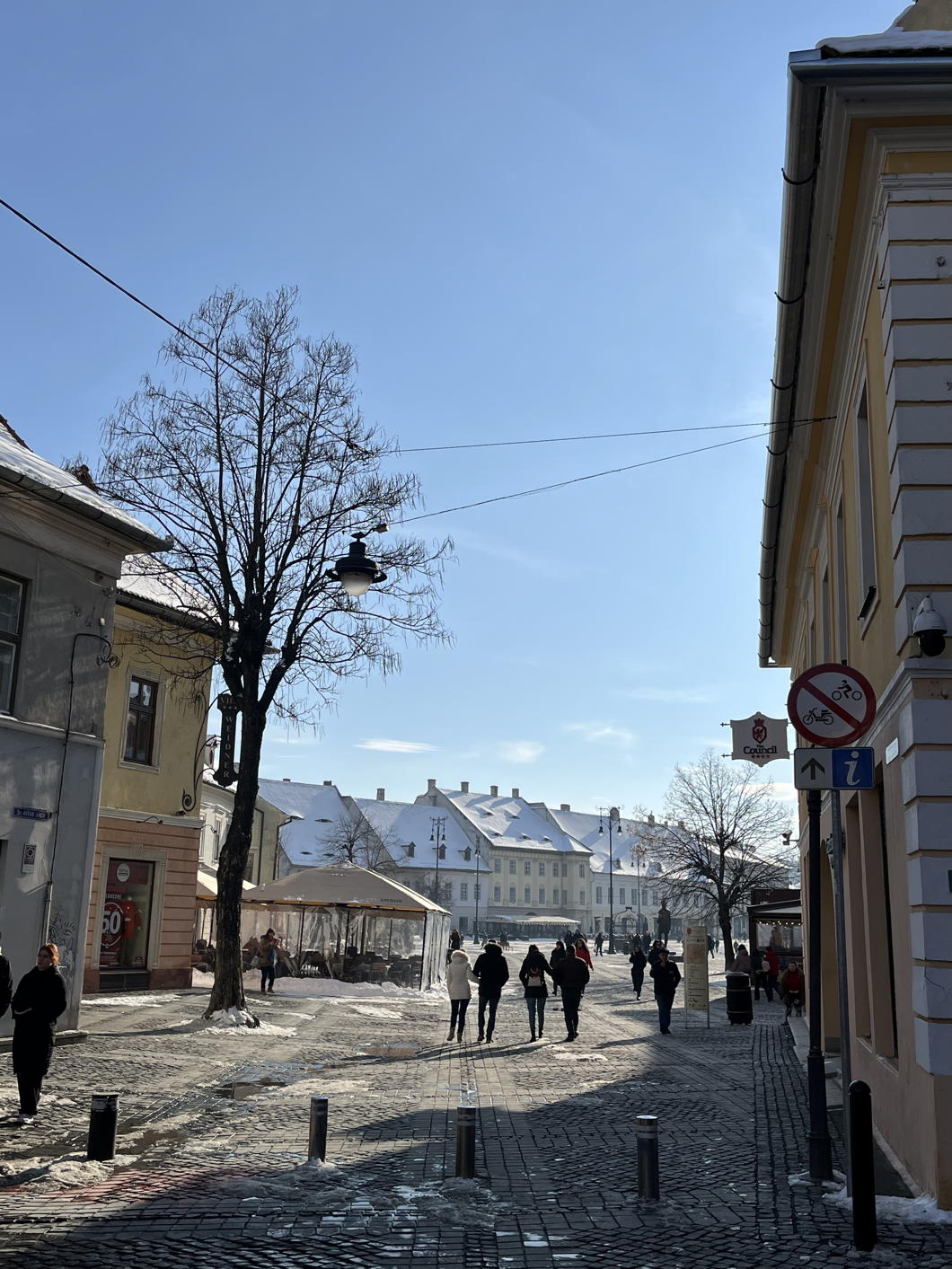
SIBIU’s name comes from a Bulgar-Turkic root word meaning “rejoice”, and having spent a few days in the city I can see why. It is handsome, clean, and clearly well looked after — perhaps well loved is the better term.
Unsurprisingly, the mayor partly responsible for this state of affairs was much vaunted for his efforts, to the extent that the Romanians elected him president of the entire country (and this despite him being an ethnic German).
As in all of Transylvania, there is a long history of mixture here, and while the past hundred years have seen a massive collapse in the Hungarian, German, and Jewish populations, many of them persevere all the same, sometimes even flourishing.
Hungarians are the largest and most visible minority in Transylvania — once the dominant people of this province of the Crown of St Stephen — but here in Sibiu they play second-fiddle to the Germans.
Arriving in the Church of the Holy Trinity in the great square for the Hungarian Mass on Sunday, the congregation at the Mass in German preceding it was still filtering away and clearly is the main event of the parish.
The Germans — or Saxons as they are often known — are today under two per cent of the city’s population but, as elsewhere, the Teutonic reputation for competence and efficiency means that a great many ethnic Romanians vote for the Germans’ party, the Democratic Forum of Germans in Romania.
When mayor Klaus Iohannis was elected to the Romanian presidency, he was succeeded as mayor by another member of the German community, the rather elegant Astrid Fodor.
But what of the ethnic Romanians that today make up ninety-five per cent of Sibiu’s townfolk? They are anything but ethnic chauvinists, and seem keen to preserve the traditions of the city and the province, and especially to highlight Sibiu’s distinctiveness. Those I had the pleasure of interacting with were effortlessly warm, courteous, and inviting. Their language is alluringly if mistakenly familiar.
Curiously, the Grand Duchy of Luxembourg maintains a consulate here in Sibiu / Hermannstadt with the ostensible excuse that the former German dialect of the town is a close relative of Luxemburgish. The connection bore fruit when Sibiu and Luxembourg City shared the honour of being European City of Culture in 2007.
It was around that time that Forbes magazine rated Sibiu as the seventh most idyllic place to live in Europe — ahead of Rome and just behind Budapest. While such ratings are always arbitrary, I can’t help but share their desire to praise this felicitous city. (more…)
Squabbles Over Szekler Flag
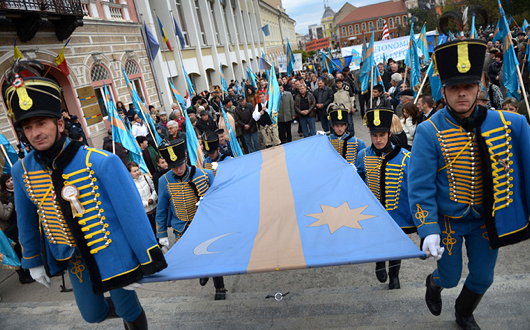
In Transylvania, a “flag war” has broken out between Romanian politicians and the representatives of the Hungarian-speaking Szekler people. As România Libera reports, no one is offended by flying the old Hapsburg flag over the fortress of Alba Iulia (De: Karlsburg, Hu: Gyulafehérvár), the Romanian government takes umbrage at the appearance of the blue-and-gold flag of the Szekler (or Székely) people who live primarily in three of Transylvania’s counties. (more…)
Of tribes and traditions
In tribal Africa, Ghaddafi expounds traditional government; Meanwhile ethnic Romanians vote to be ruled by their German neighbours.

«Ghaddafi dreams of kings, princes, sultans, sheiks»
reports the Afrikaans newspaper Die Burger.
ONE OF THE LESS-REPORTED aspects of the selection of Col. Moammar al-Ghaddafi, the tent-dwelling Libyan leader and notorious eccentric, as Chairman of the African Union was his proposal that an upper house of “kings, princes, sultans, sheiks, and other traditional leaders” be added to the Pan-African Parliament. Col. Ghaddafi has been forthright in his condemnation of democracy as ill-suited to the African continent. “We don’t have any political structures [in Africa], our structures are social,” he explained to the press. Africa is essentially tribal, the argument goes, and as such multi-party democracy always develops along tribal lines, which eventually leads to tribal conflict and warfare. “That is what has led to bloodshed,” the AU chairman posited, citing the recent example of the Kenyan elections.
Europe, of course, solved the matter of tribal difficulties by brutally uprooting long-established peoples from their native lands after the Second World War and transferring them to jurisdictions in which they would ostensibly be part, not only of the majority, but of theoretically “national” states. Cities with centuries of Polish history became Soviet, towns as German as sauerkraut became Polish, and so on and so forth. Sometimes the undesired populations of multi-ethnic places were cruelly murdered, as recent revelations from the police in Bohemia have shown.
Still, remnants of the old cosmopolitan order remain. (more…)
‘The man who walked’
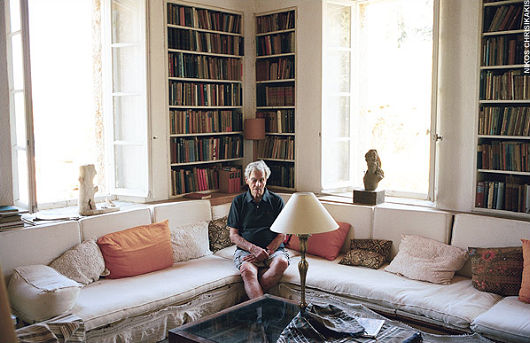
The Daily Telegraph — 6 September 2008
At 18 he left home to walk the length of Europe; at 25, as an SOE agent, he kidnapped the German commander of Crete; now at 93, Patrick Leigh Fermor, arguably the greatest living travel writer, is publishing the nearest he may come to an autobiography – and finally learning to type. William Dalrymple meets him at home in Greece
‘You’ve got to bellow a bit,’ Sir Patrick Leigh Fermor said, inclining his face in my direction, and cupping his ear. ‘He’s become an economist? Well, thank God for that. I thought you said he’d become a Communist.’
He took a swig of retsina and returned to his lemon chicken.
‘I’m deaf,’ he continued. ‘That’s the awful truth. That’s why I’m leaning towards you in this rather eerie fashion. I do have a hearing aid, but when I go swimming I always forget about it until I’m two strokes out, and then it starts singing at me. I get out and suck it, and with luck all is well. But both of them have gone now, and that’s one reason why I am off to London next week. Glasses, too. Running out of those very quickly. Occasionally, the one that is lost is found, but their numbers slowly diminish…’
He trailed off. ‘The amount that can go wrong at this age – you’ve no idea. This year I’ve acquired something called tunnel vision. Very odd, and sometimes quite interesting. When I look at someone I can see four eyes, one of them huge and stuck to the side of the mouth. Everyone starts looking a bit like a Picasso painting.’
He paused and considered for a moment, as if confronted by the condition for the first time. ‘And, to be honest, my memory is not in very good shape either. Anything like a date or a proper name just takes wing, and quite often never comes back. Winston Churchill – couldn’t remember his name last week.
‘Even swimming is a bit of a trial now,’ he continued, ‘thanks to this bloody clock thing they’ve put in me – what d’they call it? A pacemaker. It doesn’t mind the swimming. But it doesn’t like the steps on the way down. Terrific nuisance.’
We were sitting eating supper in the moonlight in the arcaded L-shaped cloister that forms the core of Leigh Fermor’s beautiful house in Mani in southern Greece. Since the death of his beloved wife Joan in 2003, Leigh Fermor, known to everyone as Leigh Fermor, has lived here alone in his own Elysium with only an ever-growing clowder of darting, mewing, paw-licking cats for company. He is cooked for and looked after by his housekeeper, Elpida, the daughter of the inn-keeper who was his original landlord when he came to Mani for the first time in 1962.
It is the most perfect writer’s house imaginable, designed and partially built by Leigh Fermor himself in an old olive grove overlooking a secluded Mediterranean bay. It is easy to see why, despite growing visibly frailer, he would never want to leave. Buttressed by the old retaining walls of the olive terraces, the whitewashed rooms are cool and airy and lined with books; old copies of the Times Literary Supplement and the New York Review of Books lie scattered around on tables between Attic vases, Indian sculptures and bottles of local ouzo.
A study filled with reference books and old photographs lies across a shady courtyard. There are cicadas grinding in the cypresses, and a wonderful view of the peaks of the Taygetus falling down to the blue waters of the Aegean, which are so clear it is said that in some places you can still see the wrecks of Ottoman galleys lying on the seabed far below.
There is a warm smell of wild rosemary and cypress resin in the air; and from below comes the crash of the sea on the pebbles of the foreshore. Yet there is something unmistakably melancholy in the air: a great traveller even partially immobilised is as sad a sight as an artist with failing vision or a composer grown hard of hearing.
I had driven down from Athens that morning, through slopes of olives charred and blackened by last year’s forest fires. I arrived at Kardamyli late in the evening. Although the area is now almost metropolitan in feel compared to what it was when Leigh Fermor moved here in the 1960s (at that time he had to move the honey-coloured Taygetus stone for his house to its site by mule as there was no road) it still feels wonderfully remote and almost untouched by the modern world.
When Leigh Fermor first arrived in Mani in 1962 he was known principally as a dashing commando. At the age of 25, as a young agent of Special Operations Executive (SOE), he had kidnapped the German commander in Crete, General Kreipe, and returned home to a Distinguished Service Order and movie version of his exploits, Ill Met by Moonlight (1957) with Dirk Bogarde playing him as a handsome black-shirted guerrilla.
It was in this house that Leigh Fermor made the startling transformation – unique in his generation – from war hero to literary genius. To meet, Leigh Fermor may still have the speech patterns and formal manners of a British officer of a previous generation; but on the page he is a soaring prose virtuoso with hardly a single living equal.
It was here in the isolation and beauty of Kardamyli that Leigh Fermor developed his sublime prose style, and here that he wrote most of the books that have made him widely regarded as the world’s greatest travel writer, as well as arguably our finest living prose-poet. While his densely literary and cadent prose style is beyond imitation, his books have become sacred texts for several generations of British writers of non-fiction, including Bruce Chatwin, Colin Thubron, Philip Marsden, Nicholas Crane and Rory Stewart, all of whom have been inspired by the persona he created of the bookish wanderer: the footloose scholar in the wilds, scrambling through remote mountains, a knapsack full of books on his shoulder.
The Sad State of the Modern Newspaper
…and the heroism of an Anglo-Hungarian countess.
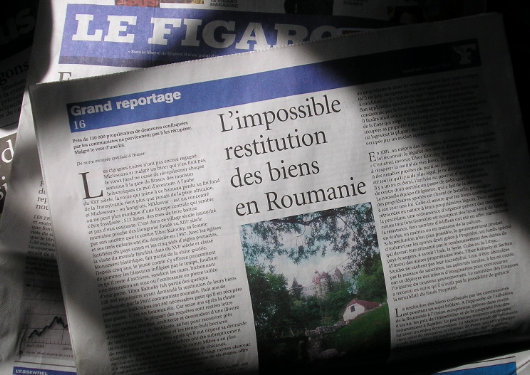
IT IS ONE OF THE more saddening facts of life that British newspapers have suffered an inexorable decline in the past few years. The great Times of London – once the most respected newspaper in the world – has been reduced to a boring mid-brow tabloid, the once-solid Scotsman idiotified and, again, tabloided, and of course the Daily Telegraph, which has gone from staunchly conservative (as in worldview) to merely Conservative (as in the tribe of Britons who prefer blue to red).
The Telegraph, like the Conservative party itself, doesn’t seem to know what it’s there for. It has at least remained a broadsheet; going tabloid would be a disaster and would probably be considered the last straw for all the die-hards for whom loyalty to one’s newspaper is a point of pride. And, to its credit, it finally seems to have realised the damage done by constant front-page photos of “Posh” and “Becks” and other “celebrity” partisans of the Anti-Culture, for they seem fewer and far between these days (as compared to a year or two ago, when they were frequent). The Telegraph‘s base are old folk who want a quality newspaper. They are loyal to the Tele and, despite its decline, would be too embarrassed to jump ship to the Guardian, which is written better but which nonetheless expones a nefarious ideology.
As for myself, the last straw came one morning in the Common Room of St. Salvator’s Hall when, flipping through the Telegraph, I reached the page which normally displays the Court Circular but found it missing, replaced by a curt statement advising that should I desire information about the activities of the Royal Family I should direct myself to http://www.royal.gov.uk. Outrageous! As it happens, this is not a permanent loss but rather an occasional one, as the editors at the Telegraph seem to decide whether or not to print the Court Circular each day on a whim. Fair enough, but I came to the realisation that the producers of the Telegraph are not aiming at me – the reasonably educated young man who seeks in his daily read a newspaper that is well-written, right-thinking, and properly presented – and so I have ceased to be a Telegraph regular.
What to read then? We have already dismissed the Times, the Scotsman, and the Guardian. The Daily Mail is always readable but arguably aimed at a different demographic; the Daily Mirror, bonkers; the Sun, no thank you!; the Financial Times is too boring, though the Weekend edition is actually worth buying most of the time; the Independent has a good layout for a tabloid, but is rather of a Lib-Dem persuasion; the Glasgow Herald is just rather dull and has only recently repented of its long-held anti-Catholicism. Not wanting to support the nefarious New York Times, enemy of Western civilization and the last word in liberal elitism, its wholly-owned subsidiary the International Herald-Tribune is ruled out. Which pretty much rules out every English language daily newspaper available in St Andrews.
 So, abandonné par ma langue, I have outsourced my daily read to the Continent (of all places!) and am now a partisan of Le Figaro. While by no means fluent in the language, I can comprehend written French with greater ability than I speak it. And while I still prefer the feel of a broadsheet, the Berliner size of Le Figaro has its advantages, being very easy to read in the confined space of my regular chair in the corner of the little coffee shop down the street. More importantly, I find it much more engaging mentally, which I put down to the fact that (not being a native or fluent French speaker) I am forced to read every word. Reading the Telegraph one unthinkingly only actually reads every third or so word; articles of particular interest excepted, naturally. The day’s Figaro usually arrives in the middle of the day or the afternoon, but I buy my paper in the morning so actually I’m usually reading the previous day’s Figaro. I don’t mind, it suits my current routine. (Mornings are for reading the newspaper in a coffee shop, afternoons are for reading books with a slow pint in the pub.)
So, abandonné par ma langue, I have outsourced my daily read to the Continent (of all places!) and am now a partisan of Le Figaro. While by no means fluent in the language, I can comprehend written French with greater ability than I speak it. And while I still prefer the feel of a broadsheet, the Berliner size of Le Figaro has its advantages, being very easy to read in the confined space of my regular chair in the corner of the little coffee shop down the street. More importantly, I find it much more engaging mentally, which I put down to the fact that (not being a native or fluent French speaker) I am forced to read every word. Reading the Telegraph one unthinkingly only actually reads every third or so word; articles of particular interest excepted, naturally. The day’s Figaro usually arrives in the middle of the day or the afternoon, but I buy my paper in the morning so actually I’m usually reading the previous day’s Figaro. I don’t mind, it suits my current routine. (Mornings are for reading the newspaper in a coffee shop, afternoons are for reading books with a slow pint in the pub.)
The chief deficit of reading a French newspaper is that naturally the news is oriented towards France, and thus I don’t get the usual transatlantic focus of the British papers (which can be an advantage as well as a deficit, I’ll concede). Nonetheless, it does happen to have articles of interest to any trad.
A few weeks ago, Le Figaro reported on the restitution of Romanian castles to their original, pre-Communist owners (‘L’impossible restitution des biens en Roumanie’, Le Figaro, 21 April 2006). The New York Sun rather amusingly and provincially headlined the story “Westchester Man To Take Possesion of Dracula’s Castle” — the New York Post characteristically used the headline “VLAD TIDINGS“. (FTD also reported on the restitution of Bran). When I wrote my previous post on the subject I was under the impression that Bran was one of the castles which would be restituted and then purchased back by the Romanian government, but most sources imply that this is not the case and Dominic von Habsburg (of North Salem, New York) will actually take possesion of the castle, I’m glad to hear.
This morning, then, I read in Le Figaro of the controversy surrounding a red star which remains on a Soviet war memorial in a small town in Hungary, a country which has banned all Communist and Nazi emblems (‘Hongrie: Le pasteur, la comtesse et l’étoile rouge’, Le Figaro, 6 May 2006). The local Protestant minister has been fighting to replace the red star, and has found an ally in Countess Jeanne-Marie Wenckheim-Dickens. The Countess, aged 70 and a descendant of Charles Dickens, returned to Hungary a few years ago after her husband died. The family had fled the country in 1944 just escaping the conquering Red Army. “I return home,” the Countess says (‘with a delicious British accent’, Le Figaro reports), “and what do I find? My castle transformed into an elementary school with, right in front of the gate, a red star! To me, this star is the Antichrist.”
The Countess funded the restoration of her former castle, now a school, and obtained permission from the town to live in the old presbytery, an ancillary building of the old castle. But when, in 2004, she proposed to mark the accession of Hungary to the European Union by replacing the red star on the monument with a European flag, the ex-Communists in the town hall told her she “should not be afraid of the red star, but of the Cross!” With fighting spirit, “I placed a large cross on my entryway,” the Countess says, “then I painted it gold so that the Mayor, whose window is opposite, can see it all the better.”
“Crosses? She can build a hundred of them!” the Mayor said. “It doesn’t disturb me!” But in return the Mayor had a house on what was the domain of the Wenckheim family renovated for the use of unemployed local gypsies. “It was clearly to annoy me,” the Countess said. “They thought the gypsies were going to make the area around the nearby church, built by my grandfather, filthy. But not at all! They respect the place, and I, I love their music very much.” The Countess also gives weekly catechism lessons to the local gypsies. In her window, she displays a letter to the people of the town inviting them to vote for the conservative Fidesz party. “In December,” the Countess continues, “before Christmas, I add little angels and holy pictures; they don’t like that much across the way, since they’re aimed at the town hall. Because I, too, have a star: but is the star of the Shepherd”.
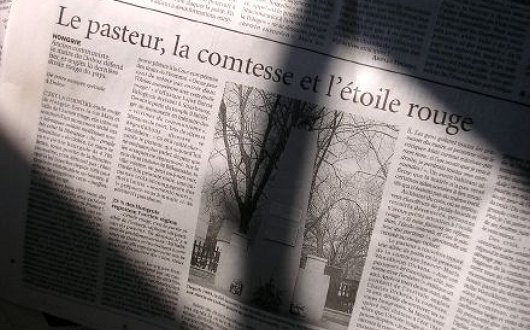
The Restitution of Romanian Castles
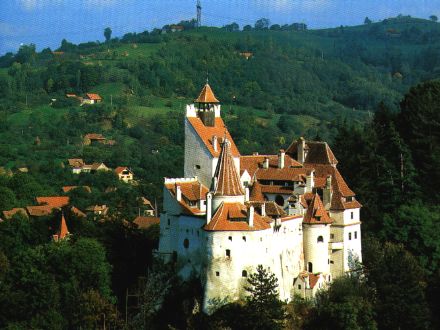
The castle of Bran (above), and the castles of Peles (below), and Pelisor (bottom) are to be restituted by the Romanian government to the Habsburgs and the Hohenzollern-Sigmaringens respectively, and then purchased back by the government for over $60 million, according to Adrian Iorgulescu, the Romanian Minister of Culture. The castles were illegitimately seized by the Communist authorities after they took power in 1947, and after buying them back the government will keep the castles as museums.
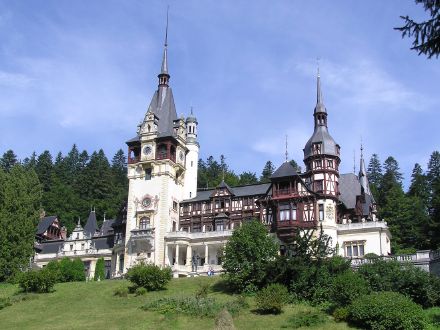
The Habsurgs are the Imperial Family of Austria as well as being the Royal Family of Hungary, Bohemia, Dalmatia, Croatia, Slavonia, Galicia, Lodomeria, Illyria, and Jerusalem, and the Ducal Family of Tuscany, Krakow, Lorraine, Salzburg, Styria, Carinthia, Carniola, the Bukovina, Transylvania, Upper Silesia, Lower Silesia, Modena, Parma, Piacenza, Guastalla, Auschwitz, Zator, Teschen, Friuli, Ragusa, and Zara. The Hohenzollern-Sigmaringen family, on the other hand, are a cadet branch of the senior Swabian branch of the Hohenzollerns, and are the Royal Family of Romania, which has been a republic since the Communist takeover in 1947 and has since, sadly, failed to restore its monarchy. Unlike the more reknowned Hohenzollerns of Brandenburg, the Romanian Royal Family are not Protestant.
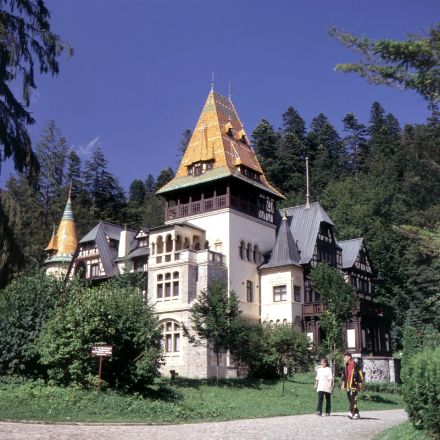
UPDATE: A reader corrects: “The Hohenzollern-Sigmaringens are not the cadet branch, but in fact the surviving senior branch, which position they inherited upon the extinction in the male line of the true senior line, the Hohenzollern-Hechingens, in 1869. Historically they are of minor importance in comparison to their apostate cousins, but still a storied family. Schloss Sigmaringen, by the way, is a magnificent seat, romantically restored in the 19th century. They own it still, but do not tend to live within its forbidding walls. I was shown round it once in dead of winter: an unforgettable experience.”
Search
Instagram: @andcusack
Click here for my Instagram photos.Most Recent Posts
- Sag Harbor Cinema March 26, 2025
- Teutonic Takeover March 10, 2025
- Katalin Bánffy-Jelen, R.I.P. March 3, 2025
- Substack Cusackiensis March 3, 2025
- In the Courts of the Lord February 13, 2025
Most Recent Comments
Book Wishlist
Monthly Archives
Categories

